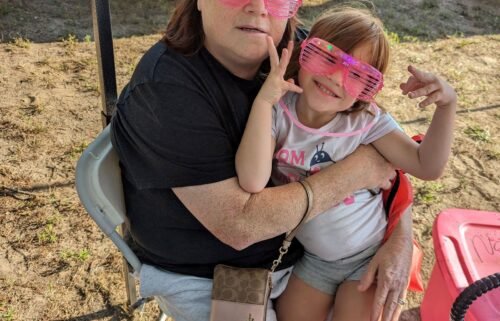Worried about your kid’s development? Turn to your doctor before the internet or friends

Opinion by Dr. Neha Chaudhary, CNN
If you’re worried about whether your child is hitting developmental milestones on time— like walking, socializing or talking— you might be relieved to know that you are like many other parents and that feeling worried is okay.
Nearly a quarter of parents suspect some degree of delay when it comes to their child, according to a new national University of Michigan C.S. Mott Children’s Hospital poll on children’s health. But the nearly one in five parents who worried that their child was behind in hitting milestones didn’t seek advice from a professional.
As a child psychiatrist, I’m concerned, however, that out of those parents who were worried or had questions about their children’s development, almost 20% did not seek help from healthcare providers, childcare providers or other professionals. Instead, one in five parents turned to far less reliable sources— like family, friends or social media.
“It is natural and expected for parents to scour the internet and social media looking for answers, but that can open a floodgate of information and subsequent anxiety for the 2:00 a.m.-Googling-parent,” says Dr. Alok Patel, pediatrician at Stanford Children’s Health.
While these sources may seem like a convenient starting point, they can be rife with misinformation that lead families astray and cause delays in getting your child the help they really need. Instead, parents should be turning to their healthcare providers — like pediatricians — for guidance. Here’s why.
1. Your pediatrician is trained to understand your child’s development
A pediatrician’s evaluation of your child is informed by years of training and a much deeper understanding of how and why a child’s brain might be developing the way it is, as well as what’s normal versus what is not. They likely have followed your child for a while and can pick up on the individual nuances of your unique child. While the internet can provide some information, only a trained health professional can apply that information in the right way for your particular child and provide reassurance where it’s due.
“I’d much rather have parents take their serious medical concerns to a pediatrician than the world wide web of anxiety,” Patel said. “We’re trained to not only identify and manage medical conditions; we also have the experience to be able to calm and reassure parents.”
While specialty care — like seeing a child psychiatrist or developmental neurologist — can also be helpful for some families, for others it might be harder to find, and more costly. In contrast, check-up visits with a pediatrician are typically relatively easy to set up once your child has been plugged into the practice.
2. Misinformation can cause serious harm
While the internet is full of convenient, at-your-fingertips information, not all information is created equal— and discerning fact from fiction can be a challenge. I’ve had countless patients tell me that they wish they had come to see me sooner for an evaluation. Often, they delayed getting help because something they read online misled them to pursue unhelpful home remedies or decide their child’s diagnosis was something different. In many of those instances, the child’s condition ended up getting worse with the delay in care. Typically, when it comes to health issues, the earlier something is identified and treated, the better the outcome.
Patel notes that the converse is true as well: “I have also seen children rushed into the emergency department because the internet scared the parents into thinking their children had cancer.”
Parents looking for quick and seemingly convenient information should be sure to examine the source of the information that they find through a Google search or on social media. Is it citing a scientific study, or another type of sound evidence, or are the claims not back my research?
“What seems like a credible medical article could actually be one trying to sell you a product or push a political agenda,” cautions Patel.
Even if the information is science-backed, parents should use this as only a starting point— a way in which to have on their radar a particular issue that they can then talk to their child’s pediatrician about.
3. Information may be accurate but may not apply to your child
A high-quality article about developmental milestones might be helpful from an educational standpoint, but it won’t always pertain to your particular child and the attributes that make them unique. Some parents might become anxious or worried about something more serious when, in reality, their child’s development is normal for their own curve—something of which a healthcare professional might be able to provide reassurance.
“Often, parents worried about missed milestones simply need reassurance, signs to look out for, and to be reminded that children sometimes progress at different speeds,” said Patel.
Others may dismiss a concern as “not a big deal” when it really is something for which the child should seek early medical attention. By educating yourself through vetted sources and turning to a professional, you reduce the chances of being vulnerable to the potential harm of inapplicable information and a delay in what might be really needed for your child.
4. We go straight to professionals for non-healthcare matters
When we have questions about law, we typically turn to lawyers instead of looking up laws and trying to interpret legal codes on the internet. If we are faced with an electrical issue, most of us turn to an electrician for help. Unfortunately, when it comes to health concerns, for many families there are often several steps in between noticing a potential issue and actually seeking medical help—if the latter even happens— and most of those steps are far less reliable or credible.
While internet searches or turning to friends may seem more convenient, it comes at a cost of potential harm to your child— something that can be avoided by turning to a professional first, just like we do in other areas of life to avoid that dangerous cost.
5. Let’s bust the stigma against getting help
If parents notice their own tendency to seek help from professionals in other arenas but think twice before seeking help of a healthcare professional when health concerns arise, I’d encourage parents to examine their own hesitation. Are you worried about what you might find if your child sees a professional? Is it easier to avoid seeking definitive help because that makes it feel more real? Is it fear of judgement from a health professional?
Whatever the reason might be — and it’s likely different for everyone — hesitation to seek help from trusted professional resources might be a sign of feeling like getting help is stigmatized, something that many families wrestle with. Getting help should instead be applauded.
Addressing stigma, however, is not only up to patients and parents— it’s a shared responsibility, one in which healthcare workers play an integral role.
“Too many times, I’ve heard from parents who turned to the internet because they felt ashamed to ask their pediatrician a question,” said Patel. “If we’re going to build trust, we need to collectively end these stigmas. A start would be to encourage dialogue, actively listen, and not alienate anyone for asking us questions about themselves or their children.”
Whether your question or concern is about your child’s physical, social or emotional development or their general health and wellbeing, a healthcare professional’s office is still the best — and most trustworthy — place to turn for a check-up. Our kids deserve the best care possible.
The-CNN-Wire
™ & © 2021 Cable News Network, Inc., a WarnerMedia Company. All rights reserved.



